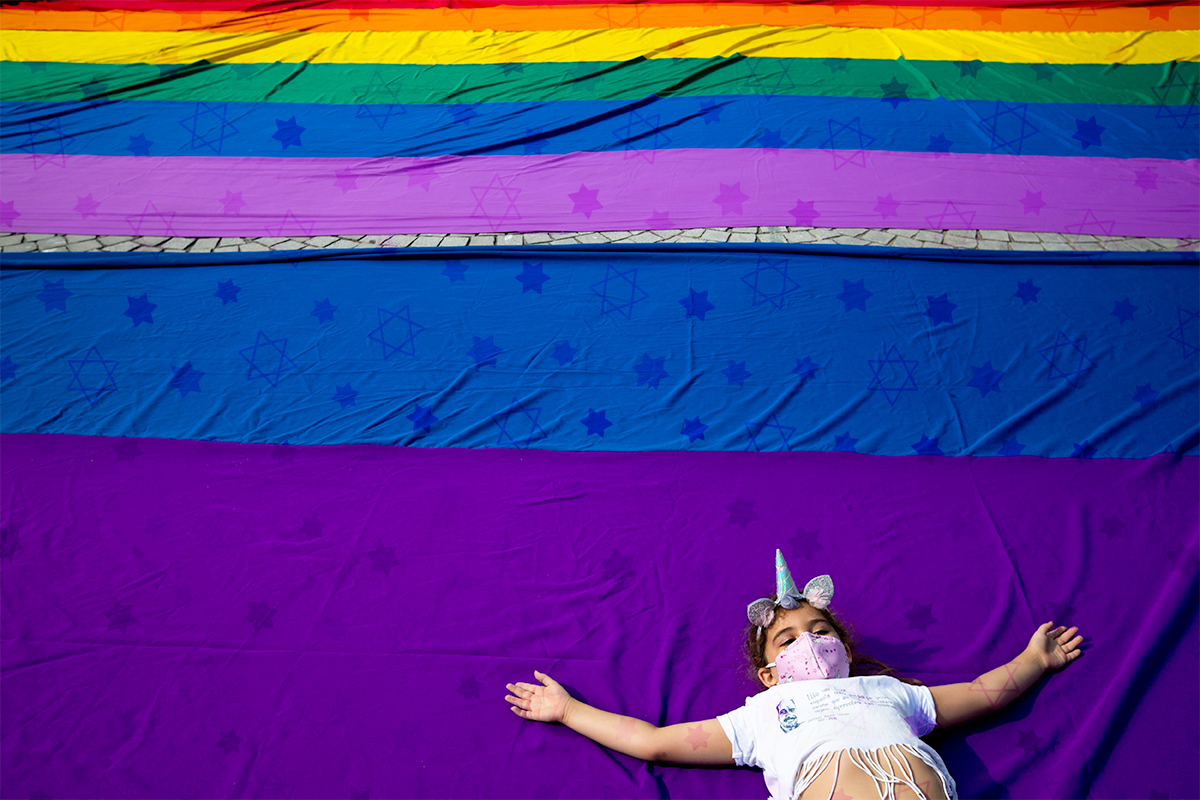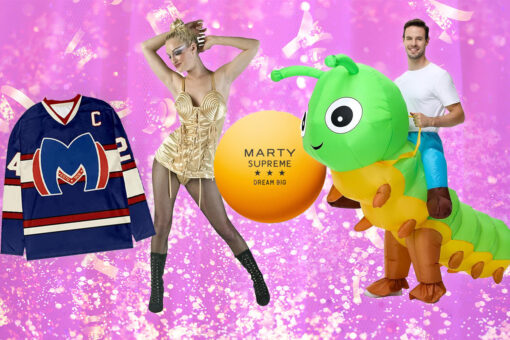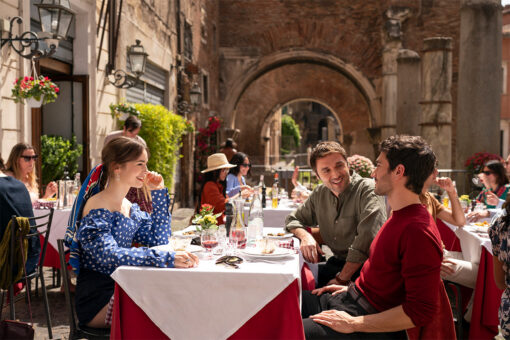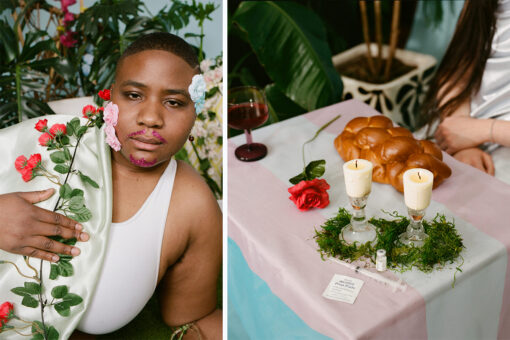“Little girls don’t sit that way, turn your chair around.”
I was 3 years old in my JCC preschool classroom and me and some of my friends, who happened to be boys, had turned our chairs around so they looked like motorcycles; we were pretending. “Little girls don’t sit that way,” my teacher repeated. My whole body flooded with embarrassment, shame, and confusion. What was wrong with what I was doing? If my friends could do it, why couldn’t I? I’m being told I’m a girl and somehow that’s different than being a boy? But I don’t want to be a girl. I’m not a girl.
I tucked that interaction away in my mental file folder labeled “Things To Avoid So I’m Not Publicly Humiliated Again.” It also could have been called “Being Called a Girl Feels Weird and Wrong But I Don’t Know Why.” This is one of my first memories and it wasn’t so great.
Years later, back at the JCC, I discovered I loved camp. It was a five-minute drive from my house and I can remember the excitement in my belly for each of those minutes until I was finally dropped off into the arms of my favorite counselors. Even now, when the temperature is just right outside in the early mornings, I’m immediately transported back and can feel the dew on my Teva’d toes and the breeze on my Umbro’d legs. Camp to me was a time to be free, play, explore, and be myself, but I always found it so odd that our groups were divided so that girls were in one bunk and the boys were in another.
Being in the girls’ bunk never felt quite right to me. I just felt out of place, always trying too hard to fit in with the girls. But I also didn’t long to be in the boys’ bunk; I just wanted to be in a group with my friends regardless of their gender.
The summer going into fourth grade, my mom signed me up for Jewish sleepover camp. I was pumped. My friend Rachel, who was a few years older than me, went to the same camp and would send me these awesome, rainbow-colored postcards that were basically like Mad Libs, and I always wanted to send those just like her. But a few nights before I was supposed to hop on the bus, I threw a tantrum and begged my mom to keep me home. I couldn’t bear the thought of going anymore. In the moment, I was convinced it was because I couldn’t be away from my mom that long (oy) but in hindsight, I know I didn’t want to be in the girls’ cabin, and so I simply didn’t go.
And then, of course, there was my bat mitzvah, something that I definitely did not want. At all. I didn’t want to become a woman. I didn’t want to wear a dress. I didn’t want to slow dance with a boy at my party. The disconnect between how I felt and who I am was so deeply present at 12 years old, yet I didn’t have the language or understanding around why. I was forced to move through the world in a gender that wasn’t mine. The representation and knowledge around trans identities (though we’ve been around since the beginning of time) was so limited that I didn’t even know what was possible.
Whether it was in preschool being shamed for playing make believe wrong or at camp in the wrong bunk, or later in BBYO, Hillel, and beyond, I always felt like an imposter. It was very lonely and isolating and also very frustrating not being able to articulate my needs. I felt separate from my Jewish community. No matter how hard I tried to belong, I just couldn’t find my true spot.
I recognize that part of the problem was because I was having trouble finding myself, but I always thought that the Jewish community was supposed to help me on my journey to self, not throw me off course.
Even though thinking about “what ifs” is generally not a good idea, I can’t help but wonder what my life would have been like if the Jewish spaces throughout my life were set up to support trans and nonbinary/genderqueer people as an integral part of their community and not as some kind of outlier or burden. I wonder what could have happened if the idea of gender exploration was celebrated, not shamed. And I wonder what we can do to ensure that kids growing up today in the Jewish community don’t feel the way I did.
Our words, actions, and inactions influence and impact our communities. Here are some simple ways that we can all show up for all the folks in our communities:
1. Synagogues need to start normalizing the idea that there are bar mitzvahs, bat mitzvahs, and gender-neutral B mitzvahs. By making all three of them equally accessible and not relegating the B mitzvah to a “special option,” you’re creating space for kiddos of all genders to have an affirming ceremony launching them into adulthood. Having it readily available instead of “upon request” also takes the burden off of a child to advocate for it. Does your congregation give out gifts in honor of the B mitzvah? Instead of candlesticks for the girls and a wine glass for the boys, why not give a choice, or even better, give both to each kid?
2. Jewish summer camps should have all-gender bunks/cabins in addition to single-gender groups and let the campers decide where they’ll feel the safest and most affirmed. When we bunk boys and girls separately, two things are happening simultaneously: First, we’re assuming there are only two genders and that all kiddos are one of those two binary genders. We know this is not true. And we’re also assuming all kids are straight and so by separating boys and girls, we’re ensuring the “safety” of our campers and eliminating the possibility of sexual activity. Again, we know that all kids are not straight, and I hate to break it to you, camp directors, but if campers are going to hook up, they’re going to hook up regardless of what cabin they’re in. Why don’t we instead have conversations around privacy, consent, and healthy boundaries?
3. Expand your language and avoid saying “boys and girls” when addressing a group of kids, instead saying “children” or “students” or “campers.” This may seem small, but think about the genderqueer, nonbinary, gender expansive/creative kiddos who simply don’t see themselves in the word boy or girl and how othering it might feel.
When institutions proactively create spaces and moments for folks of all genders, it’s not to “take experiences or moments away from boys and girls,” but to allow all kids to have the same special moments and connections to Judaism and these traditions. It takes a lot of the pressure off of the trans/nonbinary/genderqueer folks to have to continuously advocate for our needs. It presents opportunity and visibility into a truth we might not have yet realized.



